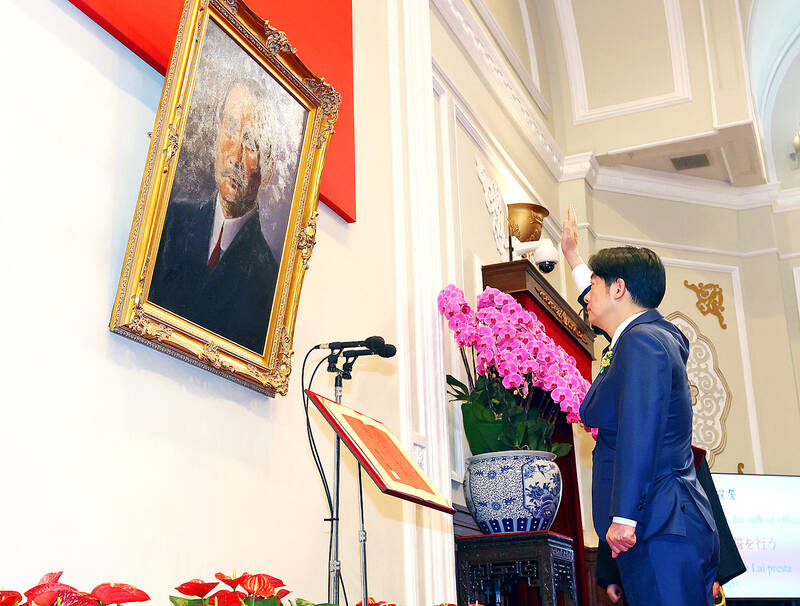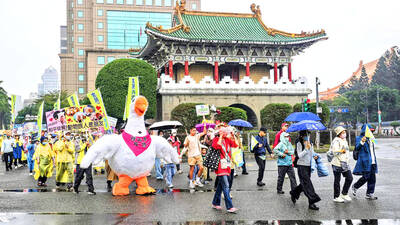President William Lai’s (賴清德) emphasis on a new “two-state theory” in his inaugural speech on Monday would only expose cross-strait relations to more unpredictable risks and challenges, former president Ma Ying-jeou (馬英九) told a forum in Taipei yesterday.
“As a former president of the Republic of China [ROC], I would urge President Lai, for the sake of people in Taiwan, to revise his new “two-state theory” in his inaugural speech, putting aside his political ideology and considering the welfare of Taiwanese,” Ma said.
“He should have dialogue with the government across the Strait by returning to historical and cultural common ground with the Chinese. Only in this manner can there be a chance for peace in the Taiwan Strait,” he added.

Photo: Taipei News Photographer Association / Bloomberg
Lai said in his speech that China should face the reality of the ROC’s existence, and that the ROC and the People’s Republic of China (PRC) are not subordinate to each other.
The statement was perceived by some as promoting a “two-state theory.”
Ma echoed the sentiment in a forum on cross-strait relations under the Lai administration hosted by Chinese Culture University.
The Democratic Progressive Party (DPP) administration has in the past eight years failed to establish a channel of communication with China, Ma said.
As such, when two Chinese fishers who illegally entered waters around Kinmen County died during a pursuit by Taiwan’s coast guard, people were concerned that it could trigger a conflict, he said.
“The solutions to cross-strait disagreements can be found in the Constitution,” he said. “Amendments to the Constitution stipulate that Taiwan and China maintain a special relationship, which is not that of between two countries before the two areas are unified. Only by upholding this position stated in the Constitution can a cross-strait war be prevented.”
KMT legislators, whose party has the most seats in the legislature, should ask Premier Cho Jung-tai (卓榮泰) about his interpretation of cross-strait relations according to the Constitution, whether it is that of “two countries” or “two areas,” he said.
Ma said that poor cross-strait ties were due to the DPP government’s unwillingness to recognize the Constitution’s description of the relationship and the so-called “1992 consensus.”
The “consensus” refers to a tacit understanding between the KMT and the Chinese Communist Party (CCP) that both sides of the Strait acknowledge there is “one China,” with each side having its own interpretation of what “China” means.
Ma said that in his meeting with Chinese President Xi Jinping (習近平) in Singapore on Nov. 7, 2015, he had assured Xi that Taiwan’s interpretation of “one China” would neither turn Taiwan and China into two separate states nor turn Taiwan into an independent nation.
When the two spoke this year, Xi told him that he hoped that cross-strait exchanges would continue and be held frequently, so long as Taiwan and China acknowledge that they are both Chinese and share the same ancestors, Ma said.
Separately yesterday, former vice premier Cheng Wen-tsan (鄭文燦), who heads the Straits Exchange Foundation in the new administration, defended Lai’s inauguration address.
Lai reaffirmed in his speech Taipei’s willingness to engage in dialogue with Beijing and uphold the “status quo” based on the Constitution, Cheng said, adding that Lai also reiterated the stance that the ROC and the PRC are not subordinate to each other.
The main points in Lai’s speech on cross-strait ties were that China cannot avoid dialogue with Taiwan’s elected government, and that it should choose “exchanges over containment, and dialogue over confrontation,” Cheng said.
Lai’s cross-strait rhetoric was in line with that of many former presidents, including Lee Teng-hui (李登輝), Chen Shui-bian (陳水扁) and Tsai Ing-wen (蔡英文), with the only exception being Ma, who upheld the “1992 consensus,” Cheng said.
The DPP has never acknowledged the “1992 consensus,” arguing that Beijing allows no room for the interpretation of “China” as the ROC, he said.
Acceptance of the “consensus” would imply agreement with China’s claim over Taiwan, he added.
Additional reporting by CNA

NUMBERS IMBALANCE: More than 4 million Taiwanese have visited China this year, while only about half a million Chinese have visited here Beijing has yet to respond to Taiwan’s requests for negotiation over matters related to the recovery of cross-strait tourism, the Tourism Administration said yesterday. Taiwan’s tourism authority issued the statement after Chinese-language daily the China Times reported yesterday that the government’s policy of banning group tours to China does not stop Taiwanese from visiting the country. As of October, more than 4.2 million had traveled to China this year, exceeding last year. Beijing estimated the number of Taiwanese tourists in China could reach 4.5 million this year. By contrast, only 500,000 Chinese tourists are expected in Taiwan, the report said. The report

Temperatures are forecast to drop steadily as a continental cold air mass moves across Taiwan, with some areas also likely to see heavy rainfall, the Central Weather Administration (CWA) said. From today through early tomorrow, a cold air mass would keep temperatures low across central and northern Taiwan, and the eastern half of Taiwan proper, with isolated brief showers forecast along Keelung’s north coast, Taipei and New Taipei City’s mountainous areas and eastern Taiwan, it said. Lows of 11°C to 15°C are forecast in central and northern Taiwan, Yilan County, and the outlying Kinmen and Lienchiang (Matsu) counties, and 14°C to 17°C

STEERING FAILURE: The first boat of its class is experiencing teething issues as it readies for acceptance by the navy, according to a recent story about rudder failure The Hai Kun (海鯤), the nation’s first locally built submarine, allegedly suffered a total failure of stern hydraulic systems during the second round of sea acceptance trials on June 26, and sailors were forced to manually operate the X-rudder to turn the submarine and return to port, news Web site Mirror Daily reported yesterday. The report said that tugboats following the Hai Kun assisted the submarine in avoiding collisions with other ships due to the X-rudder malfunctioning. At the time of the report, the submarine had completed its trials and was scheduled to begin diving and surfacing tests in shallow areas. The X-rudder,

DEMAND: The government should enact regulations in line with Austria and Germany to incorporate vegan nutrition into school meals, an advocate said More than 1,000 people yesterday marched in Taipei to promote veganism, calling for legislation to incorporate vegan diets into school lunches and the national net zero emissions program. Participants gathered on Ketagalan Boulevard in front of the Presidential Office Building for the march, which was organized by the Vegan Action Network (VAN). Former ambassador to Chad Chiu Chung-jen (邱仲仁), actor Yankee Yang (楊子儀) and actress Cindy Lien (連俞涵) attended the event. VAN member Marianne Chao (趙梅君) said that the campaign aimed to urge the government to promote vegan diets across schools and government agencies via legislation and national policies, which would help build